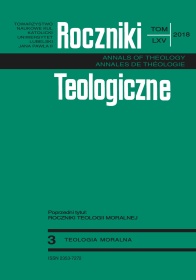Wkład Marie-Dominique Chenu i Paula Ricœura w odnowę nauki społecznej Kościoła w okresie wczesnej recepcji Soboru Watykańskiego II
Abstrakt
Przedmiotem artykułu jest ukazanie wkładu dwóch myślicieli czasu Soboru Watykańskiego II Marie-Dominique Chenu oraz Paula Ricœura w debatę dotyczącą statusu metodologicznego i zadań nauki społecznej Kościoła. Okres bezpośredniej recepcji soborowej jawi się jako czas ujawnienia się kryzysu nauki społecznej Kościoła i jej regresu. Prezentacja wkładu powyższych badaczy nauki społecznej Kościoła została dokonana na tle procesu kształtowania się nowej formy obecności i relacji Kościoła do świata współczesnego.
Bibliografia
Chenu Marie-Dominique, La „dottrina sociale” della Chiesa, tłum. z franc. A. Alberigo, „Concilium” (it) 16(1980), s. 17-52.
Chenu Marie-Dominique, La Chiesa ha ancora una dottrina sociale? w: L'uomo del settimo giorno, red. G. Zizola, Borla, Roma 1977, s. 126-130.
Chenu Marie-Dominique, La dottrina sociale della Chiesa. Origine e sviluppo, Queriniana, Brescia 1977.
Iannarone Reginaldo A., Si può ancora parlare di una „dottrina sociale” cattolica? „Sapienza” 27(1974), s. 159-175.
Kaufmann Ludwig, Gott im Herzen der Geschichte, w: M.-D. Chenu, Kirchliche Soziallehre in Wandel. Das Ringen der Kirche um das Verständnis der gesellschaftlichen Wirklichkeit, Exodus, Freiburg−Luzern 1991, s. 101-121.
La dottrina sociale della Chiesa oggi, „La Civiltà Cattolica” 139(1988), t. 1, s. 521-534.
Łukaszewski Jerzy, Robert Schuman − Człowiek. Myśl. Dzieło, w: „Ojcowie współczesnej Europy”, [Materiały z konferencji. Wydane staraniem Fundacji K. Adenauera i Fundacji R. Schumana], „Kontrast”. Wydawnictwo Fundacji ATK, Warszawa 1993, s. 15-29.
Między ludzką słabością i heroizmem. Z profesorem Vittorio Possentim rozmawiają Tadeusz Styczeń SDS i Jarosław Merecki SDS, „Ethos” (1998), nr 3, s. 277-297.
Osés José María, La doctrina social de la Iglesia a la luz de la teología actual de la salvación, Raycar, Madrid 1974.
Possenti Vittorio, Wprowadzenie, w: „Rewolucja Ducha”. Doktryna społeczna Kościoła widziana oczyma kard. Karola Wojtyły, Centrum Myśli Jana Pawła II i Fronda, Warszawa 2007, s. 13-19.
Querejazu Javier, La moral social y el Concilio Vaticano II. Génesis, instancias y cristalizaciones de la Teología moral social postvaticana, Eset, Vitoria 1993.
Querejazu Javier, La teología moral social postvaticana. Génesis e instancias, „Moralia” 14(1992), s. 261-294.
Ricœur Paul, Le project d'une morale sociale, w: Vivre et croire. Chemins de sérenité, red. A. Dumas, R. Simon, Cerf-Desclée, Paris 1974, s. 101-113 (tłum. polskie: Etyka społeczna na rozstajach, tłum. H.B., „Znak” 19(1967), s. 920-925).
Thesing Josef, Konrad Adenauer – życie i dzieło, w: „Ojcowie współczesnej Europy”. [Materiały z konferencji. Wydane staraniem Fundacji K. Adenauera i Fundacji R. Schumana], „Kontrast”. Wydawnictwo Fundacji ATK, Warszawa 1993, s. 30-42.
Wojtyła Karol, Czy jest możliwa nauka społeczna Kościoła. [Wywiad udzielony dr. Vittorio Possentiemu dn. 21 czerwca 1978 r. w Mediolanie], w: „Rewolucja Ducha”. Doktryna społeczna Kościoła widziana oczyma kard. Karola Wojtyły, Centrum Myśli Jana Pawła II i Fronda, Warszawa 2007.
Wywiad z Karolem Wojtyłą o nauce społecznej Kościoła (1978) – świadectwo, tłum. T. Żeleźnik, „Społeczeństwo” 13(2003), nr 5, s. 733-737.
Copyright (c) 2018 Roczniki Teologiczne

Utwór dostępny jest na licencji Creative Commons Uznanie autorstwa – Użycie niekomercyjne – Bez utworów zależnych 4.0 Międzynarodowe.





